宜昌市金东方2014-2015年高二6月月考英语试题及答案
湖北省宜昌市金东方高级中学2014-2015学年高二下学期4月月考英语试题word版含答案
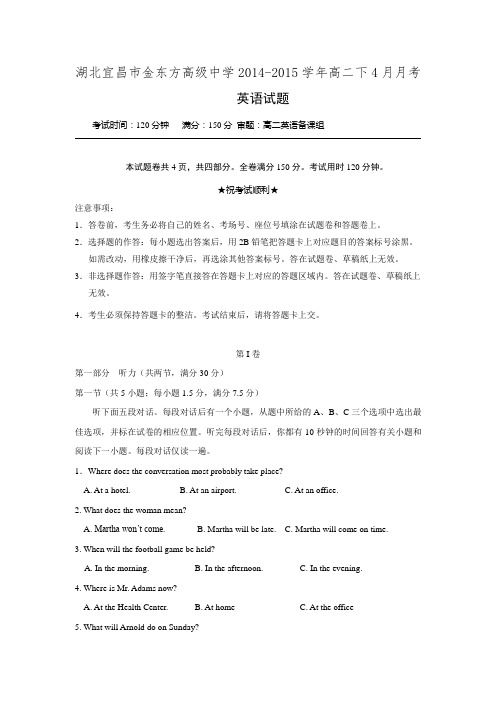
湖北宜昌市金东方高级中学2014-2015学年高二下4月月考英语试题考试时间:120分钟满分:150分审题:高二英语备课组本试题卷共4页,共四部分。
全卷满分150分。
考试用时120分钟。
★祝考试顺利★注意事项:1.答卷前,考生务必将自己的姓名、考场号、座位号填涂在试题卷和答题卷上。
2.选择题的作答:每小题选出答案后,用2B铅笔把答题卡上对应题目的答案标号涂黑。
如需改动,用橡皮擦干净后,再选涂其他答案标号。
答在试题卷、草稿纸上无效。
3.非选择题作答:用签字笔直接答在答题卡上对应的答题区域内。
答在试题卷、草稿纸上无效。
4.考生必须保持答题卡的整洁。
考试结束后,请将答题卡上交。
第I卷第一部分听力(共两节,满分30分)第一节(共5小题;每小题1.5分,满分7.5分)听下面五段对话。
每段对话后有一个小题,从题中所给的A、B、C三个选项中选出最佳选项,并标在试卷的相应位置。
听完每段对话后,你都有10秒钟的时间回答有关小题和阅读下一小题。
每段对话仅读一遍。
1.Where does the conversation most probably take place?A. At a hotel.B. At an airport.C. At an office.2. What does the woman mean?A. Martha won’t come.B. Martha will be late.C. Martha will come on time.3. When will the football game be held?A. In the morning.B. In the afternoon.C. In the evening.4. Where is Mr. Adams now?A. At the Health Center.B. At homeC. At the office5. What will Arnold do on Sunday?A. Go swimming.B. Play football.C. Play tennis.第二节(共15小题;每小题1.5分,满分22.5分)听下面5段对话或独白。
湖北省宜昌市2014-2015学年高二下学期期末调研考试英语试卷(A卷,扫描版)
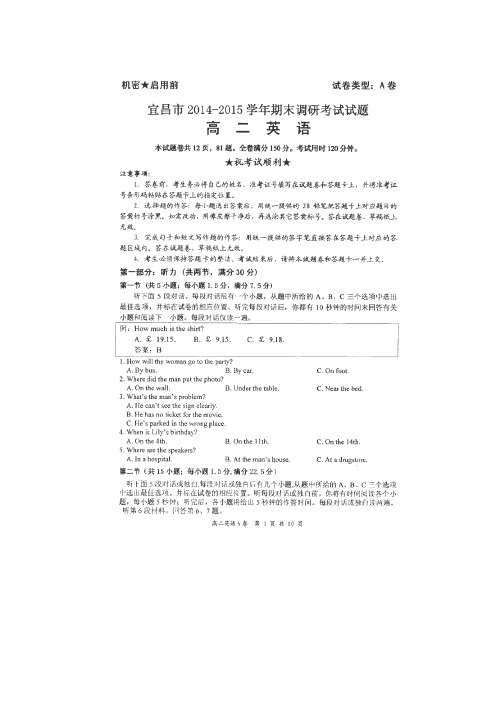
2015年宜昌市学年调研考试高二英语A卷试题答案、录音稿及其解析命题人:刘成等审题:刘文军罗凤英第一部分:听力1-5 BCCBA 6-10 BACCA 11-15 ACABC 16-20 BBAAC第二部分:阅读理解A (21-24)ADBA B.(25-27)CDA C.(28-31)BDCD D.(32-35)CDBA七选五答案: 36-40 CADFB第三部分:英语语言知识运用完形填空 41-60ADDCC 46-50 CBADB 51—55ADBCB 56—60 ACBCD语法填空61. are considered 62. if/whether 63. following 64. saying 65. realize66. harm 67. is taken 68. the 69. which 70. ourselves第四部分:书面表达改错:71. naming —named 72. think it good 去掉it 73. went —go 74. surprising —surprised 75. and chatting —or chatting 76. which —where 77. an —the 78. use∧it —of 79. measure —measures 80.positive —positively写作:Smoking is a very bad habit, which can do you as well as the people around you in three main respects. First, smoking can damage your organs especially your lungs. Every year many smokers die of the lung cancer. Second, it will bring extra economic burden to your family. Smoking is just a waste of money. Not being breadearners, you depend totally on your parents for a living and you shouldn’t abuse your parents’ money. Third, smoking carelessly, you can set off a fire and may cause great damages to your family or other people.In a word, smoking can bring you nothing but harms and damages. All teenage smokers should be fully aware of the harm smoking brings you. Only if so are you determined to give it up.听力材料Text 1M: Would you like to join me at the evening party?W: I’ d love to, but I don’t like taking the bus at night and walking seems a little dangerous.M: Sam has a car, so he’ll be able to pick you up to the evening party.W: Oh, that would be good.Text2W: Where’s the photo? It’s not on the wall.M: Oh, I took it down last week.W: Where did you put it?M: Uh, where did I put it? Oh, here it is! It’s on the table, next to the bed.Text3W: Sir, did you see the “No Parking” sign?M: I won’t be here long. My wife will finish her movie in five minutes.W: Sorry, Sir, not even for one minute. You’ll get fined if you don’t go.Text4W: What day is it today?M: Today is Friday the 4th.W: Friday? Shouldn’t you go to Lily’s birthday party?M: Well , her birthday party is next Friday.Text5M: Thanks so much for coming to visit me.W: No problem. How do you feel?M: Not too bad. The doctors say I’ll be able to leave in a few days.W: That’s fine.Text6W: Honey, how long have we been living here?M: About 10 years . W hat’s wrong?W: I’m thinking about making our house fresh.M: That would cost a lot of money. But we do need to make some changes to our house.W: Right. What about repainting the living room in yellow?M: Good idea.W: And we can also ask someone to draw a picture on the wall.M: It sounds great. And the gray curtain should be changed too.W: Ok. Maybe we should make a plan first.M: Yeah , then go to prepare the material.Text7M: Hi, Monica.W: Oh, Alex! What are you doing here? You don’t go to this college, do you?M: No, I don’t. But my cousin Samantha invited me to this party. But actually I’m not really enjoying the music. In fact, they’re playing the kind of music that I hate.W: Oh, I love this music. I’ll never get tired of listening to it. Anyway, you can talk to people. There are too many people here.M: That’s true, but I’ve never met anyone here who I’m really interested in talking to.W: Oh, I almost forgot. I’ve just begun to learn rock climbing, and you’re good at it. I need your advice. Let’s go over there where it’s less crowded.M: Ok.Text8M: Air pollution is so bad in this city. I think the government should stop people from driving cars on certain days.W: You have a point. Air pollution is a problem. But not letting people drive on certain days is a bad idea. People have to go to work by car.M: I’m afraid I don’t agree with you there. Reducing air pollution is really important. People are so used to driving that they don’t think about ways to do things. If we stop them from driving on certain days, maybe they could think of new ways to get around.W: I see your point. But I still think it wouldn’t be possible to stop people from driving.Text9W: Have you read this article about the girl named Sarah who gave up a modeling job?M: Of course I have, she lives in the same neighbourhood with me. Why?W: Why on earth didn’t she take it? She could have made millions.M: But at the same time if she doesn’t value that, so what? I think it’s really nice that it’s not the main thing that she wants to show herself. What a wise decision!W: Yeah, but all the same, if not for herself she ought to have done it for her family. Her dad must have felt sick when she turned the offer down.M: What on earth for! He’s got no right! It’s none of his business. I blame him for talking to the newspapers. He shouldn’t have spoken to them in the first place. It’s his fault for attracting all this interest.W: That’s not fair. He’s her dad. He didn’t want to see her throw away the chance of alifetime, that’s all.M: All right, but the thing is, I really enjoyed school and had a good time, and I think I would miss a lot if I hadn’t stayed at school, and maybe she thinks that she would have lost out too.W: I suppose so. But I bet she’ll regret it later on.Text10Asking for directions can be risky. I realised exactly how risky it could be when I needed to meet one of my friends one day. A while ago, I arranged to meet my friend at a new shopping center. My friend had been there before and said that we should shop there together. We planned to meet at 3:00 p.m. at burger palace in the shopping center. When I arrived at he shopping center, I realised I did not know where burger palace was, so I asked a cleaner for directions. She advised me to go straight, and turn right before the clothes store. She mentioned that I would walk for a few minutes , passing a bookstore until I reached burger palace, which was next to the shoe store.I followed her directions and arrived just in time. Twenty minutes later I was beginning to wonder where my friends was. Thirty minutes later, I was afraid for her. I did not know what to do, so I just kept waiting at around 3:40p.m., I saw my friend walking quickly toward me. I rushed to her and demanded to know what happened. “I was at the other b u rger palace!” she cried. We had not realised there were two burger palaces in the shopping center.答案及其解析:21. 考查细节理解。
湖北省宜昌市金东方高级中学高二英语上学期第三次月考试题
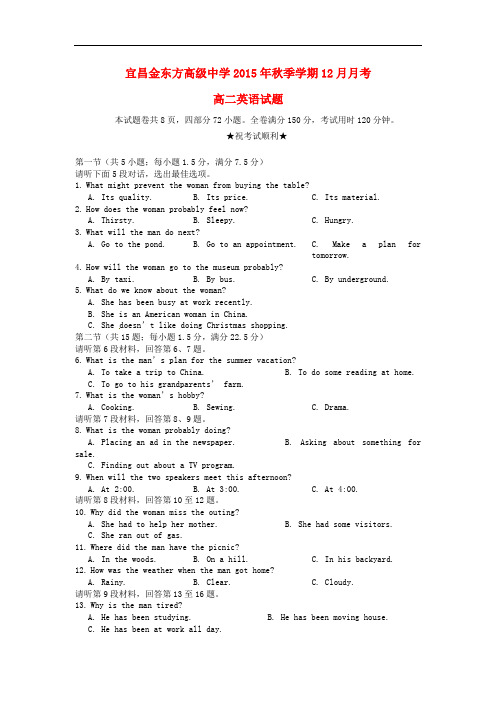
宜昌金东方高级中学2015年秋季学期12月月考高二英语试题本试题卷共8页,四部分72小题。
全卷满分150分,考试用时120分钟。
★祝考试顺利★第一节(共5小题;每小题1.5分,满分7.5分)请听下面5段对话,选出最佳选项。
1.What might prevent the woman from buying the table?A. Its quality.B. Its price.C. Its material.2.How does the woman probably feel now?A. Thirsty.B. Sleepy.C. Hungry.3.What will the man do next?A. Go to the pond.B. Go to an appointment.C. Make a plan fortomorrow.4.How will the woman go to the museum probably?A. By taxi.B. By bus.C. By underground.5.What do we know about the woman?A. She has been busy at work recently.B. She is an American woman in China.C. She doesn’t like doing Christmas shopping.第二节(共15题;每小题1.5分,满分22.5分)请听第6段材料,回答第6、7题。
6.What is the man’s plan for the summer vacation?A. To take a trip to China.B. To do some reading at home.C. To go to his grandparents’ farm.7.What is the woman’s hobby?A. Cooking.B. Sewing.C. Drama.请听第7段材料,回答第8、9题。
湖北省宜昌市金东方高级中学高一英语上学期期末考试试卷
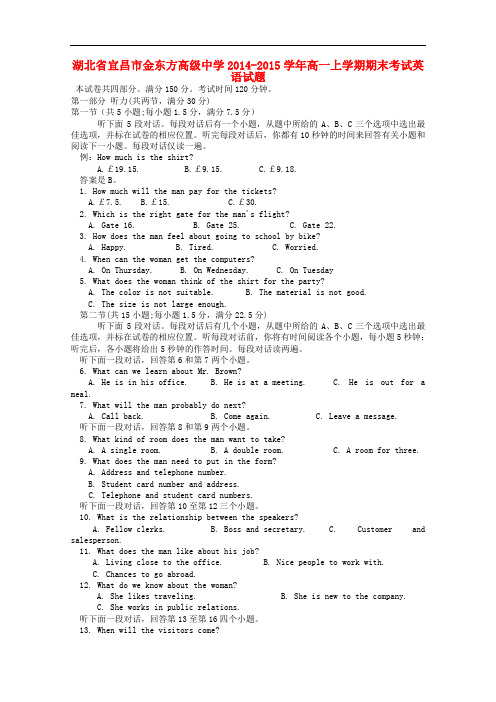
湖北省宜昌市金东方高级中学2014-2015学年高一上学期期末考试英语试题本试卷共四部分。
满分150分。
考试时间120分钟。
第一部分听力(共两节,满分30分)第一节(共5小题;每小题1.5分,满分7.5分)听下面5段对话。
每段对话后有一个小题,从题中所给的A、B、C三个选项中选出最佳选项,并标在试卷的相应位置。
听完每段对话后,你都有10秒钟的时间来回答有关小题和阅读下一小题。
每段对话仅读一遍。
例:How much is the shirt?A.£19.15.B.£9.15.C.£9.18.答案是B。
1. How much will the man pay for the tickets?A.£7.5.B.£15.C.£30.2. Which is the right gate for the man's flight?A. Gate 16.B. Gate 25.C. Gate 22.3. How does the man feel about going to school by bike?A. Happy.B. Tired.C. Worried.4. When can the woman get the computers?A. On Thursday.B. On Wednesday.C. On Tuesday5. What does the woman think of the shirt for the party?A. The color is not suitable.B. The material is not good.C. The size is not large enough.第二节(共15小题;每小题1.5分,满分22.5分)听下面5段对话。
每段对话后有几个小题,从题中所给的A、B、C三个选项中选出最佳选项,并标在试卷的相应位置。
听每段对话前,你将有时间阅读各个小题,每小题5秒钟;听完后,各小题将给出5秒钟的作答时间。
高二英语下学期6月月考试卷(含解析)-人教版高二全册英语试题
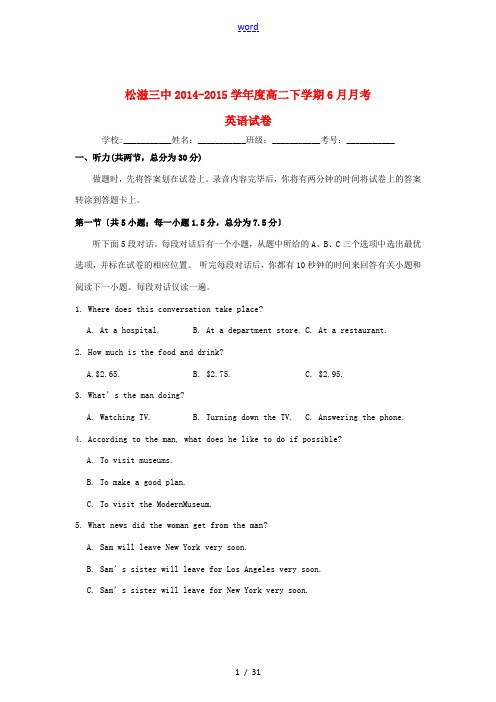
松滋三中2014-2015学年度高二下学期6月月考英语试卷学校:___________姓名:___________班级:___________考号:___________一、听力(共两节,总分为30分)做题时,先将答案划在试卷上。
录音内容完毕后,你将有两分钟的时间将试卷上的答案转涂到答题卡上。
第一节〔共5小题;每一小题1.5分,总分为7.5分〕听下面5段对话。
每段对话后有一个小题,从题中所给的A、B、C三个选项中选出最优选项,并标在试卷的相应位置。
听完每段对话后,你都有10秒钟的时间来回答有关小题和阅读下一小题。
每段对话仅读一遍。
1. Where does this conversation take place?A. At a hospital.B. At a department store.C. At a restaurant.2. How much is the food and drink?A.$2.65.B. $2.75.C. $2.95.3. What’s the man doing?A. Watching TV.B. Turning down the TV.C. Answering the phone.4. According to the man, what does he like to do if possible?A. To visit museums.B. To make a good plan.C. To visit the ModernMuseum.5. What news did the woman get from the man?A. Sam will leave New York very soon.B. Sam’s sister will leave for Los Angeles very soon.C. Sam’s sister will leave for New York very soon.第二节〔共15小题;每一小题1.5分,总分为22.5分〕听下面5段对话或独白。
湖北省宜昌市金东方高级中学2014-2015学年高二上学期期末考试英语试题
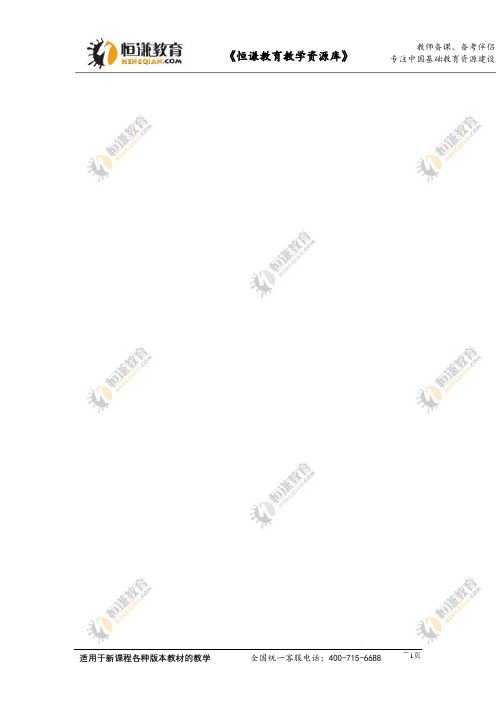
11. Where will the two speakers have dinner?
A. In a restaurant.B. At the hotel.C. In the office.
B. The man doesn’t know what he really wants.
C. The woman is going to settle down inHong NhomakorabeaKong.
请听第7段材料,回答第8、9题。
8. Where is Mr. Brown?
A. He is out in another company. B. He is in a meeting. C. He is at home.
C. Go to Alfred’s home and talk to his parents.
16. What is the probable relationship between the two speakers?
A. Classmates.B. Neighbors.C. Workmates.
请听第10段材料,回答第17至20题。
17. Where did the speaker take a journey last year?
A. In southwestAfrica.B. In southeastAfrica.C. In southwestAsia.
18. How long was the speaker’s journey?
请听第6段材料,回答第6、7题。
湖北省宜昌市金东方学校高三英语月考试题含部分解析
湖北省宜昌市金东方学校高三英语月考试题含解析一、选择题1. She didn’t feel like , so he suggested the day in the garden.A. to work, to spendB. working, to spendC. to work, spendingD. working, spending参考答案:D2. He believes the business world ______ to use 3-D video teleconferencing in the next five years.A. beginsB. has begunC. will be beginningD. will begin参考答案:D23. _______ on your study, and you will make greater progress.A. ConcentratingB. If you concentrateC. To concentrateD. Concentrate参考答案:D略4. The past two years a sharp rise in oil price, which adds to the burden of auto transportation industry.A. witnessedB. witnessesC. is witnessingD. has witnessed参考答案:D5. Thank you, Jack. Without your constant support I _____ those hard times.A. couldn’t have gone throughB. couldn’t pull throughC. can’t have lived throughD. can’t get through 参考答案:A6. —I can’t find Mr. White .Where did you meet him yesterday?—It was in the cinema we saw the movie Ender’s Game.A. thatB. whereC. whichD. there参考答案:B7. Why ____ to go abroad to study when there are so many good universities at home?A. imagineB. botherC. considerD. prevent参考答案:B8. _____ realize Linda was interested in luxury cars until I heard that she owned aPorsche and a Ferrari.A. Much I didB. Little I didC. Much did ID. Little did I参考答案:D9. -Excuse me, is the book Gone With the Wind by Margaret Mitchell available now?-Sorry, but it so well that we don't have any in store.A.sells B.is sold C.has sold D.has been sold参考答案:A【知识点】动词解析:sell well卖得好主动表被动。
2014-2015学年高二英语下学期(6月)阶段考试试题新人教版及答案
2014—2015学年度高二年级第二学期第二次阶段考试英语试卷及答案本试卷分为卷I (选择题) 和卷II(非选择题),共150分,时间120分钟。
注意:1.卷I(选择题)涂在答题卡上。
2.卷II答案写在答题纸上。
卷I (共105分)第一部分:听力(共两节,满分20分)第一节(共5小题;每小题1分,满分5分)听下面5段对话。
每段对话后有一个小题,从题中所给的A、B、C三个选项中选出最佳选项,并标在试卷的相应位置。
听完每段对话后,你都有10秒钟的时间来回答有关小题和阅读下一小题。
每段对话仅读一遍。
1. What does the woman think makes people happy?A. Money.B. Love.C. Success.2. What are the speakers talking about?A. A television.B. A picture.C. A movie.3. Where did the woman meet Alice?A. At a clothes shop.B. At a school.C. At a restaurant.4. Who is the woman?A. A house agent(房屋中介).B. A house owner.C. A house keeper(管家).5. How long can the man keep the book?A. For one week.B. For two weeks.C. For three weeks.第二节(共15小题;每小题1分,满分15分)听下面5段对话或独白。
每段对话或独白后有几个小题,从题中所给的A、B、C三个选项中选出最佳选项,并标在试卷的相应位置。
听每段对话或独白前,你将有时间阅读各个小题,每小题5秒钟;听完后,各小题将给出5秒钟的作答时间。
每段对话或独白读两遍。
听第6段材料, 回答第6、7题。
【英语】湖北省宜昌市金东方高级中学2014-2015学年高二6月月考
宜昌金东方高级中学2015年春季学期6月月考第I 卷第一部分:听力(共两节,满分30分)第二部分:阅读理解(共20小题;每小题2分,满分40分)第一节(共15小题;每小题2分,满分30分)阅读下列短文,从每题所给的四个选项(A、B、C和D)中,选出最佳选项,并在答题卡上将该项涂黑。
AIt was Mother's Day. John was so busy with his work that he couldn't go back home. When he passed by a flower shop in the evening, an idea came to his mind, “I'll send Mum some roses.”While John was picking his flowers, a young man went inside. “How many roses can I get for only five dollars, madam?” He asked. The assistant was trying to tell him roses we re as expensive as forty dollars a dozen(一打). Maybe he would be happy with carnations(康乃馨).“No, I have to have red roses,” he said. “My mum was badly ill last year and I didn't get to spend much time with her. Now I want to get something special, it has to be roses, as rose is her favourite.”After hearing it, John said he would pay the rest of the money for the young man. Moved by both of them, the assistant said, “Well, lovely young men, thirty dollars a dozen, only for you.” Taking the roses, the young man almost jumped into the air and ran out of the shop. It was well worth twenty-five dollars that John paid to see the exciting moment. Then John paid for his dozen of roses and told the assistant to send them to his mother.As he walked out, he felt nice. Suddenly he saw the young man crossing the street and going into a park. But soon John realized it was not a park but a cemetery(墓地). Crying, the young man carefully put down the roses, “Mum, oh, Mum, why didn't I tell you how much I loved you? God, please help me find my mum and tell her I love her.”Seeing this, John turned and quickly walked to the shop. He would take the flowers home himself.21. The assistant tried to ask the young man to buy carnations instead of roses because_________.A. carnations were nicer than rosesB. roses were saved for JohnC. roses were more expensive than carnationsD. carnations were special flowers for Mother's Day22. The young man cried at the cemetery because he ______.A. had spent all his money on the rosesB. wasn't able to tell his mother he loved her himselfC. felt sorry to ask John to pay for his flowersD. hadn't got enough money for his sick mother23. At last John changed his mind and went home because he wanted to ______.A. tell his mother he loved her himselfB. ask his mother for more moneyC. tell his mother the young man's storyD.ask his mother if she liked roses24. The writer writes the passage in order to tell us ______.A. Buy roses for your mother when she is illB. Let your mother know how much you love herC. Work hard to get more money for your motherD. Send your mother flowers on Mother's DayBLife is difficult.It is a great truth because once we truly understand and accept it.Then life is no longer difficult.Most do not fully see this truth.Instead they complain about their problems and difficulties as if life should be easy.It seems to them that difficulties represent(代表)a special kind of suffering especially on them or else on their families, their class, or even their nation.What makes life difficult is that the process of facing and solving problems is a painful one.Problems , depending on their nature(性质,本性), cause us sadness,or loneliness or regret or anger or fear.These are uncomfortable feelings,often as painful as any kind of physical pain.And since life causes an endless series of problems,life is always difficult and is full of pain as well as joy.Yet,it is in this whole process of solving problems that life has its meaning.Problems are the serious test that tells us success from failure.When we desire to encourage the growth of human spirit, we encourage the human ability to solve problems,just as in school we set problems for our children to solve.It is through the pain of meeting and working out problems that we learn.As Benjamin Franklin said,“ Those things that hurt , instruct(指导).”I t is for this reason that wise people learn not to fear but to welcome the pain of problems.25. The main idea of Paragraph 2 is that_______.A.most people feel life is easyB.the writer feels life is easyC.the writer likes to complain about his problemsD.most people complain about how hard their lives are26.According to the passage, we give school children difficult problems to solve in order to______.A.encourage them to learnB.teach them to face the pain of solving the problemC.help them learn to deal with painD.teach them how to respect the problems27. From the passage,it can be inferred(暗示) that _________.A.everybody has problemsB.we become stronger by meeting and solving the problems of lifeC.life is difficult because our problems bring us painD.people like to complain about their problems28.The saying from Benjamin Franklin “Those things that hurt, instruct” suggests that_______.A.we do not learn from experienceB.we do not learn when we are in painC.pain teaches us important lessonsD.pain cannot be avoidedCDo successful businessmen need an office? Increasingly the answer seems to be no.Chris Ward, author of the book Out of Office explains how President Barack Obama’s first inauguration (就职) speech was written by 27-year-old Jon Favreau sitting in Starbucks (星巴克); how Richard Tait, creator of Cranium, started the board game in a coffee shop; how Michael Acton Smith invented the children’s virtual world Moshi Monsters in his local Caffè Nero; and how JK Rowling, the novelist behind Harry Potter, believes a café is the best place to write.It is a convincing view, and for basic start-ups it makes much more sense to work from home and public spaces such as cafés than renting an expensive office. Offices are hard to find, costly to decorate and involve much tiring administration. Moreover, by staying independent you avoid the misery(痛苦)of a daily commute(往返上下班), which for many is the worst part of a job.Thanks to mobile communications, WiFi and cloud storage, together with the increasing heavy-duty equipment such as photocopiers, fax machines and desktop PCs, the traditional office is becoming redundant for many sorts of organizations and workers. Of course, factory managers, surgeons, chefs and industrial chemists are still tied to special locations. But many of us – from software engineers and copywriters to architects and fashion designers –can operate almost anywhere. That freedom, and a willingness to adapt, can make one’s career more enjoyable and, sometimes, more efficient.29. The second paragraph mainly wants to tell us__________.A. Obama didn’t write his inauguration speech by himselfB. People don’t have to work in an officeC. A café is the best place to writeD. Many writers like to write in a coffee shop30. The underlined word “redundant” in the last paragraph most probably mean_________.A. uncomfortableB.reasonableC. unnecessaryD. popular31. What can we infer from the text?A. Many people hate commuting daily.B. The tradition office will no longer exist.C. Working in public places will reduce efficiency.D. Chefs can work anywhere.DBlind tasting is a very strange activity. Contrary to what many imagine, it has nothing to dowith blindfolds. It means tasting a wine without seeing the label and it can give shocking surprises.I tasted seven champagnes(香槟) blind with a group of professionals recently. There was a shock when they discovered the wine most of them preferred carried a label which they regarded as their least favorite. That sort of result is especially common with champagne, the most image-driven(视觉导向) rather than quality-driven wine of all. But it happens all the time when wine is tasted blind.Because I’m interested in how wines really taste instead of how I think they should, I taste wine blind as often as I can, especially when assessing(评价) similar young wines. But blind tasting when you know absolutely nothing about the wine in front of you is something completely different. The most difficult Master of Wine exams include three sessions during which you have a dozen glasses in front of you and nothing more helpful than a printed exam paper asking you to identify (鉴定) each wine as closely as possible, and assess its quality.Now that the MW is behind me, I taste wine completely blind only very rarely, and never in public. So my blind tastings these days are round the dinner table with good friends and once a year when I act as a judge, with Hugh Johnson, in the Oxford v Cambridge wine-tasting competition. This is the most extraordinary match, always held before the Boat Race but taken just as seriously nowadays. This year’s taste-off took place at the end of last month, as usual in the Oxford and Cambridge Club on Pall Mall in London.32. Which of the following is true about Blind tasting?A. Blind tasting is the professional way to identify a wine.B. Blind tasting usually has the right result.C. Blind tasting means tasting a wine with one’s eyes covered.D. Blind tasting is tasting a wine without seeing the label.33. Why did the professionals get shocked at the result of their blind tasting?A. They got all the results correctly.B. They didn’t recogn ize their favorite at all.C. The writer made no mistakes.D. Champagnes can not be tasted blind.34. Which of the following interests the writer most?A. Assessing young wines.B. Master of wine exams.C. Tasting wine blind in public.D. Oxford v Cambridge wine-tasting competition.35. What can we infer from the last paragraph?A. The Boat Race is taken more seriously than the wine race.B. The Oxford v Cambridge wine-tasting competition is held annually.C. I didn’t act as a judge last year.D. Pall Mall is chosen as the competition place for the first time.第二节(共5小题;每小题2分,满分10分)根据短文内容,从短文后的选项中选出能填入空白处的最佳选项。
宜昌市金东方2014-2015年高二6月月考历史试题及答案
宜昌金东方高级中学2015年春季学期6月月考高二历史试题考试时间:90分钟满分:100分本试题卷共3页,三大题27小题。
全卷满分100分。
考试用时90分钟。
★祝考试顺利★注意事项:1.答卷前,考生务必将自己的姓名、考场号、座位号填涂在试题卷和答题卷上。
2.选择题的作答:每小题选出答案后,用2B铅笔把答题卡上对应题目的答案标号涂黑。
如需改动,用橡皮擦干净后,再选涂其他答案标号。
答在试题卷、草稿纸上无效。
3.非选择题作答:用签字笔直接答在答题卡上对应的答题区域内。
答在试题卷、草稿纸上无效。
4.考生必须保持答题卡的整洁。
考试结束后,请将答题卡上交。
第Ⅰ卷(选择题共48分)一、选择题(本大题共24个小题,每小题2分,在每小题给出的四个选项中,只有一项是符合题目要求的。
)1.中国古代实行君主集权于上、行政体制分权于下的权力制衡体制,它包含两种专制模式,一是实行集体宰相制度,二是在正式行政体制之外另设机构,以达到分权的目的。
下列选项包含这两种专制模式的是A.秦朝三公九卿制度;汉武帝“中外朝制度”B.明朝设置内阁制;清朝设立军机处C.唐朝实行三省六部制;宋设参知政事、枢密院、三司使D.唐朝实行三省六部制;清朝设立军机处2. 秦朝的“三公九卿”中,奉常掌宗庙礼仪,郎中令掌宫殿警卫,少府管皇帝的生活供应,宗正管皇帝家族和亲戚等。
这反映了中国古代政体的本质是A.职分细化,各负其责 B.化国为家,君权至上C.选贤举能,唯才是用 D.官员众多,政务繁杂3. 加官是汉武帝发明的官制。
侍中、左右曹诸吏、散骑中常侍、皆加官。
多至数十人。
虽无职掌,谓之宿卫(近在皇帝身边),讲议朝政,奉诏治事。
武帝决事禁中,希见卿相。
下列对于该机构权力的理解准确的是A.以中御外,加强皇权 B.位高权重,掌控决策C.参与机要,取代相权 D.废除丞相,皇权独揽4. 东汉王充说:“六国之时,贤才之臣,入楚楚重,出齐齐轻,为赵赵完,畔魏魏伤。
”这说明六国时期A.六国相互削弱有利秦实现统一 B.是士人阶层实践其政治理想的黄金时代C.各国选贤举能使墨学成为显学 D.“礼乐征伐自诸侯出”已成为社会常态5. 汉初儒生叔孙通曾向刘邦建议:“礼者,因时世人情为之节文者也。
- 1、下载文档前请自行甄别文档内容的完整性,平台不提供额外的编辑、内容补充、找答案等附加服务。
- 2、"仅部分预览"的文档,不可在线预览部分如存在完整性等问题,可反馈申请退款(可完整预览的文档不适用该条件!)。
- 3、如文档侵犯您的权益,请联系客服反馈,我们会尽快为您处理(人工客服工作时间:9:00-18:30)。
宜昌金东方高级中学2015年春季学期6月月考高二英语试题满分:150分,用时:120分钟★祝考试顺利★本试卷分第I卷(选择题)和第II卷(非选择题)两部分。
考生作答时,将答案答在答题卡上,在本试卷上答题无效。
第 I 卷第一部分:听力(共两节,满分30分)第一部分听力(共两节,满分30分)第一节(共5小题;每小题1.5分,满分7.5分)听下面5段对话。
每段对话后有一个小题,从题中所给的A、B、C三个选项中选出最佳选项,并标在试卷的相应位置。
听完每段对话后,你都有10秒钟的时间来回答有关小题和阅读下一小题。
每段对话仅读一遍。
1. What does the man probably do?A. A shop assistant.B. A policeman.C. A postman.2. How old is the man's daughter?A. Six months old.B. One year old.C. Two years old.3. When did the woman plan to go to Spain?A. In spring.B. In summer.C. In autumn.4. Where will the speakers go first?A. A restaurant.B. A cinema.C. A hospital.5. What does the man think of the lecture?A. It was interesting.B. It was far beyond his understanding.C. It was long but easy to understand.第二节 (共15小题;每小题1.5分,满分22.5分)听下面5段对话或独白。
每段对话或独白后有几个小题,从题中所给的A、B、C三个选项中选出最佳选项,并标在试卷的相应位置。
听每段对话或独白前,你将有时间阅读各个小题,每小题5秒钟;听完后,各小题将给出5秒钟的作答时间。
每段对话或独白读两遍。
听第6段材料,回答第6、7题。
6. What does the man usually do at home?A. Do the washing-up.B. Wash clothes.C. Clean the car.7. What does the man promise to do at last?A. Do all the housework from next weekend.B. Clean the kitchen after cooking.C. Prepare meals every day.听第7段材料,回答第8、9题。
8. How long will the man most probably rent the bike?A. From 7:00 am to 5:00 pm.B. From 9:00 am to 7:00 pm.C. From 9:00 am to 5:00 pm.9. What will happen if the man brings the bike back after 7:00 pm?A. He has to pay for the helmet.B. He can't get the 50 dollars back.C. He has to pay 50 dollars' extra money.听第8段材料,回答第10至12题。
10. Why is the woman a bit nervous?A. She is afraid of getting up late.B. She is a newcomer to the school.C. She isn’t ready for the coming exam.11. What must the students do before morning reading?A. Hand in homework.B. Do morning exercises.C. Go to the teacher’s office.12. What can the students do if they feel hungry?A. Ask the teacher for some food.B. Have something to eat in class.C. Eat something during the break.听第9段材料,回答第13至16题。
13. Where is the woman going first?A. Bergner’s.B. Penny’s.C. Lisa’s.14. When should the woman have called Helen?A.At 3:45.B.At 4:15.C.At 4:45.15. What’s the man’s telephone number?A.61199621.B.61299621.C.61299622.16. What’s the relationship between the man and the woman?A. Husband and wife.B. Boss and employee.C. Friends.听第10段材料,回答第17至20题。
17. What kind of English lessons does the speaker recommend?A. Examination skills.B. Reading and writing.C. Listening and speaking.18. How can a learner take the lessons when he is not online?A. By using the downloaded sound files.B. By making conversations with others.C. By reviewing words, phrases and idioms.19. What is mentioned as an advantage of the speaker’s online course?A. It helps learners to make friends.B. It offers learners better study methods.C. It improves learners’ listening and speaking skills quickly.20. What is the speaker’s idea about learning English?A. Being confident in learning.B. Learning English little by little.C. Having clear learning goals.第二部分:阅读理解(共20小题;每小题2分,满分40分)第一节(共15小题;每小题2分,满分30分)阅读下列短文,从每题所给的四个选项(A、B、C和D)中,选出最佳选项,并在答题卡上将该项涂黑。
AIt was Mother's Day. John was so busy with his work that he couldn't go back home. When he passed by a flower shop in the evening, an idea came to his mind, “I'll send Mum someroses.”While John was picking his flo wers, a young man went inside. “How many roses can I get for only five dollars, madam?” He asked. The assistant was trying to tell him roses were as expensive as forty dollars a dozen(一打). Maybe he would be happy with carnations(康乃馨).“No, I have to have red roses,” he said. “My mum was badly ill last year and I didn't get to spend much time with her. Now I want to get something special, it has to be roses, as rose is her favourite.”After hearing it, John said he would pay the rest of the money for the young man. Moved by both of them, the assistant said, “Well, lovely young men, thirty dollars a dozen, only for you.” Taking the roses, the young man almost jumped into the air and ran out of the shop. It was well worth twenty-five dollars that John paid to see the exciting moment. Then John paid for his dozen of roses and told the assistant to send them to his mother. As he walked out, he felt nice. Suddenly he saw the young man crossing the street and going into a park. But soon John realized it was not a park but a cemetery(墓地). Crying, the young man carefully put down the roses, “Mum, oh, Mum, why didn't I tell you how much I loved you? God, please help me find my mum and tell her I love her.”Seeing this, John turned and quickly walked to the shop. He would take the flowers home himself.21. The assistant tried to ask the young man to buy carnations instead of roses because_________.A. carnations were nicer than rosesB. roses were saved for JohnC. roses were more expensive than carnationsD. carnations were special flowers for Mother's Day22. The young man cried at the cemetery because he ______.A. had spent all his money on the rosesB. wasn't able to tell his mother he loved her himselfC. felt sorry to ask John to pay for his flowersD. hadn't got enough money for his sick mother23. At last Joh n changed his mind and went home because he wanted to ______.A. tell his mother he loved her himselfB. ask his mother for more moneyC. tell his mother the young man's storyD. ask his mother if she liked roses24. The writer writes the passage in order to tell us ______.A. Buy roses for your mother when she is illB. Let your mother know how much you love herC. Work hard to get more money for your motherD. Send your mother flowers on Mother's DayBLife is difficult.It is a great truth because once we truly understand and accept it.Then life is no longer difficult.Most do not fully see this truth.Instead they complain about their problems and difficulties as if life should be easy.It seems to them that difficulties represent (代表)a special kind of suffering especially on them or else on their families, their class, or even their nation.What makes life difficult is that the process of facing and solving problems is a painful one.Problems , depending on their nature(性质,本性), cause us sadness,or loneliness or regret or anger or fear.These are uncomfortable feelings,often as painfulas any kind of physical pain.And since life causes an endless series of problems,life is always difficult and is full of pain as well as joy.Yet,it is in this whole process of solving problems that life has its meaning.Problems are the serious test that tells us success from failure.When we desire to encourage the growth of human spirit, we enc ourage the human ability to solve problems,just as in school we set problems for our children to solve.It is through the pain of meeting and working out problems that we learn.As Benjamin Franklin said,“ Those things that hurt , instruct(指导).”It is for this reason that wise people learn not to fear but to welcome the pain of problems.25. The main idea of Paragraph 2 is that_______.A.most people feel life is easyB.the writer feels life is easyC.the writer likes to complain about his problemsD.most people complain about how hard their lives are26.According to the passage, we give school children difficult problems to solve in order to______.A.encourage them to learn B.teach them to face the pain of solving the problem C.help them learn to deal with pain D.teach them how to respect the problems27. From the passage,it can be inferred(暗示) that _________.A.everybody has problemsB.we become stronger by meeting and solving the problems of lifeC.life is difficult because our problems bring us painD.people like to complain about their problems28.The saying from Benjamin Franklin “Those things that hurt, instruct” suggests that_______.A.we do not learn from experience B.we do not learn when we are in painC.pain teaches us important lessons D.pain cannot be avoidedCDo successful businessmen need an office? Increasingly the answer seems to be no.Chris Ward, author of the book Out of Office explains how President Barack Obama’s first inauguration (就职) speech was written by 27-year-old Jon Favreau sitting in Starbucks (星巴克); how Richard Tait, creator of Cranium, started the board game in a coffee shop; how Michael Acton Smith invented the children’s virtual world Moshi Monsters in his local Caffè Nero; and how JK Rowling, the novelist behind Harry Potter, believes a café is the best place to write.It is a convincing view, and for basic start-ups it makes much more sense to work from home and public spaces such as cafés than renting an expensive office. Offices are hard to find, costly to decorate and involve much tiring administration. Moreover, by staying independent you avoid the misery(痛苦) of a daily commute(往返上下班), which for many is the worst part of a job.Thanks to mobile communications, WiFi and cloud storage, together with the increasing heavy-duty equipment such as photocopiers, fax machines and desktop PCs, the traditional office is becoming redundant for many sorts of organizations and workers. Of course, factory managers, surgeons, chefs and industrial chemists are still tied to special locations. But many of us – from software engineers and copywriters to architects and fashion designers – can operate almost anywhere. That freedom, and a willingness to adapt, can make one’s career more enjoyable and, sometimes, more efficient.29. The second paragraph mainly wants to tell us__________.A. Obama didn’t write his inauguration speech by himselfB. People don’t have to work in an officeC. A café is the best place to writeD. Many writers like to write in a coffee shop30. The underlined word “redundant” in the last paragraph most probably mean_________.A. uncomfortableB.reasonableC. unnecessaryD. popular31. What can we infer from the text?A. Many people hate commuting daily.B. The tradition office will no longer exist.C. Working in public places will reduce efficiency.D. Chefs can work anywhere.DBlind tasting is a very strange activity. Contrary to what many imagine, it has nothingto do with blindfolds. It means tasting a wine without seeing the label and it can giveshocking surprises. I tasted seven champagnes(香槟) blind with a group of professionals recently. There was a shock when they discovered the wine most of them preferred carrieda label which they regarded as their least favorite. That sort of result is especially commonwith champagne, the most image-driven(视觉导向) rather than quality-drive n wine of all.But it happens all the time when wine is tasted blind.Because I’m interested in how wines really taste instead of how I think they should,I taste wine blind as often as I can, especially when assessing(评价) similar young wines.But blind tasting when you know absolutely nothing about the wine in front of you is something completely different. The most difficult Master of Wine exams include three sessions duringwhich you have a dozen glasses in front of you and nothing more helpful than a printed exampaper asking you to identify (鉴定) each wine as closely as possible, and assess its quality.Now that the MW is behind me, I taste wine completely blind only very rarely, and neverin public. So my blind tastings these days are round the dinner table with good friendsand once a year when I act as a judge, with Hugh Johnson, in the Oxford v Cambridgewine-tasting competition. This is the most extraordinary match, always held before the BoatRace but taken just as seriously nowadays. This year’s taste-off took place at the endof last month, as usual in the Oxford and Cambridge Club on Pall Mall in London.32. Which of the following is true about Blind tasting?A. Blind tasting is the professional way to identify a wine.B. Blind tasting usually has the right result.C. Blind tasting means tasting a wine with one’s eyes covered.D. Blind tasting is tasting a wine without seeing the label.33. Why did the professionals get shocked at the result of their blind tasting?A. They got all the results correctly.B. They didn’t recognize their favorite at all.C. The writer made no mistakes.D. Champagnes can not be tasted blind.34. Which of the following interests the writer most?A. Assessing young wines.B. Master of wine exams.C. Tasting wine blind in public.D. Oxford v Cambridge wine-tasting competition.35. What can we infer from the last paragraph?A. The Boat Race is taken more seriously than the wine race.B. The Oxford v Cambridge wine-tasting competition is held annually.C. I didn’t act as a judge last year.D. Pall Mall is chosen as the competition place for the first time.第二节(共5小题;每小题2分,满分10分)根据短文内容,从短文后的选项中选出能填入空白处的最佳选项。
